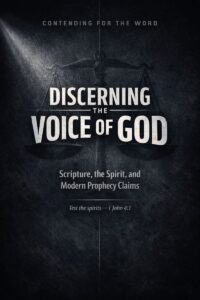⏱️ Estimated Reading Time: 4 min read
How to Understand the Bible: Why It Matters
Practical Ways to Learn How to Understand the Bible
By Dave Jenkins
“Do your best to present yourself to God as one approved, a worker who has no need to be ashamed, rightly handling the word of truth.”
—2 Timothy 2:15
Why Learning How to Understand the Bible Matters
One of the greatest privileges of the Christian life is learning how to understand the Bible with clarity, reverence, and joy. Reading Scripture isn’t just about flipping through pages—it’s about seeking to know what God has said and why it matters. That’s why faithful interpretation is essential.
Interpretation is necessary not because Scripture is unclear, but because God revealed His Word through real people, in real places, at real times, using real languages. The Bible is rich, layered, and theologically deep. Understanding it requires reverence, tools, and a heart eager to hear from God.
This work is not limited to pastors or theologians. Every Christian has the joyful responsibility to read and interpret God’s Word faithfully. The question is not whether we interpret—we all do. The question is whether we do so faithfully.
Why the Bible Requires Interpretation
1. It Was Written in Real History
The Bible was written by Spirit-inspired authors in real historical and cultural settings. To understand its meaning, we must grasp the context. For example, the Old Testament laws on ceremonial cleanliness make sense when interpreted within the covenant with Israel, not directly applied to modern life.
2. It Contains Many Literary Styles
Scripture includes a variety of genres—poetry, prophecy, wisdom literature, gospels, epistles. Each follows unique conventions. Reading a Psalm like a doctrinal epistle can distort meaning. Genre-awareness is essential to faithful interpretation.
3. It Was Written in Other Languages
The Bible was originally written in Hebrew, Aramaic, and Greek. While modern translations are excellent, every translation involves interpretation. Using trustworthy tools like study Bibles and lexicons helps clarify meaning and avoid confusion.
4. It’s Timeless Yet Written in Time
God’s Word is eternal, but it was written in specific moments in redemptive history. The truths apply to us today, but interpretation bridges the gap between then and now. That’s how we apply timeless truths to today’s world.
7 Principles for Faithful Interpretation
1. Know the Genre
Ask: What kind of writing is this? Narrative, prophecy, poetry, or something else? Genre determines how we read and understand the text.
2. Pay Attention to Context
Never isolate a verse. Read the verses before and after. Understand the chapter, book, and Bible-wide context for clarity.
3. Start with the Plain Meaning
Let the passage speak plainly. Don’t force symbolic or hidden meanings unless the text clearly signals it.
4. Seek the Author’s Intent
Interpretation begins by asking: What did the human author intend to communicate under the Spirit’s inspiration?
5. Study the Language
Use trusted tools to explore key terms. Word studies, concordances, and cross-references can enrich your understanding.
6. Look for Theology
What does the passage teach about God, man, sin, salvation, or Christ? Every passage reveals something about God’s redemptive story.
7. Keep God at the Center
The Bible isn’t first about us—it’s about God. Keep your eyes on Christ and how each passage fits into the whole gospel story.
Interpretation and Discipleship
Jesus rebuked religious leaders for misinterpreting Scripture (Matthew 22:29). Paul told Timothy to rightly handle the Word (2 Timothy 2:15). The Bereans examined the Scriptures daily (Acts 17:11).
In a world of spiritual confusion, faithful interpretation keeps us grounded. It protects the church from error and forms us into Christlikeness.
Faithful Bible interpretation anchors us in what God actually said—not what we wish He said.
Let the Word Dwell Richly in You
Faithful interpretation is part of discipleship. Whether preparing a sermon or reading during your quiet time, interpret the Bible with humility, clarity, and reverence.
“Let the word of Christ dwell in you richly…”
—Colossians 3:16
Come to Scripture expecting to hear from the Lord. And may the Spirit help you rightly handle the Word of truth and apply it to all of life.
📚 For More Resources
Check out our series on Scripture for Life for more on the doctrine of Scripture and biblical interpretation.
For more help growing in biblical literacy, see Dave’s book on the topic.
Check out Blue Letter Bible for great Bible resources.
Frequently Asked Questions
Why is it important to understand the Bible?
Understanding the Bible allows believers to know God’s truth, apply it to their lives, and grow in discipleship. Misunderstanding Scripture leads to confusion and error.
Do I need seminary training to interpret Scripture?
No. While training helps, every Christian is called to rightly handle God’s Word using faithful tools, prayer, and community.
What are the best tools for understanding the Bible?
Study Bibles, commentaries, Bible dictionaries, and tools like Blue Letter Bible can help clarify meaning and context.



